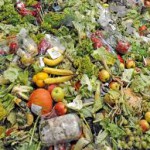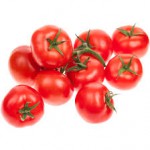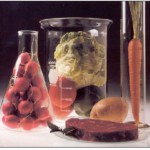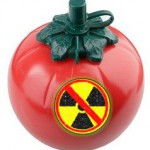 The irradiation of tomatoes & capsicums (bell peppers) has been approved by Food Standards Australia New Zealand (FSANZ). In Australia, all irradiation is done with nuclear material.
The irradiation of tomatoes & capsicums (bell peppers) has been approved by Food Standards Australia New Zealand (FSANZ). In Australia, all irradiation is done with nuclear material.
the average Australian consumes an estimated 23kgs of tomato-based products per year – FIWatch in submission to FZANZ
A1069 and the FSANZ assessment of it are based on primary, unpublished research conducted by Qld DEEDI, the applicant itself. Both the Queensland government and FSANZ admit the existing literature on the irradiation of tomatoes and capsicums has “limited”value or relevance. They then emphasise that their own unpublished research was conducted under conditions similar to those expected when tomatoes and
capsicums are irradiated here in Australia and appear to rely on this as the basis for their argument that they do not need to have their own research peer-reviewed or tested by an independent agent.
Now, A1069 (the application for the irradiation of tomatoes and capsicums) only requires rubber-stamping from the Ministerial Council. Each state has at least one STATE MP on the Council. Let your local member know that you say NO!!!
The irradiation of tomatoes and capsicums poses a risk to our community and is not in the public interest. A1069 must be rejected.
Australian Government:
Hon Tanya Plibersek MP
Minister for Health and Ageing
150 Broadway, Chippendale NSW 2008 Minister.Plibersek@health.gov.au
The Hon Catherine King, MP
Parliamentary Secretary for Health and Ageing
PO Box 6022, House of Representatives
Parliament House Canberra ACT 2600 Catherine.King.MP@aph.gov.au
Senator the Hon Joe Ludwig
Minister for Agriculture, Fisheries and Forestry
GPO Box 2477, Brisbane QLD 4001 joe.ludwig@maff.gov.au
New Zealand:
The Hon Nikki Kaye. MP,Minister for Food Safety
P.O. Box 47-658,Ponsonby
Auckland 1144 New Zealand mp.aucklandcentral@parliament.govt.nz
Australian State & Territory Reps:
QLD
Lead Minister: The Hon Lawrence Springborg, MP
Minister for Health
GPO Box 48, Brisbane QLD 4001 Health@ministerial.qld.gov.au
The Hon John McVeigh MP
Minister for Agriculture, Fisheries and Forestry
GPO Box 46, Brisbane QLD 4001 Agriculture@ministerial.qld.gov.au
NSW
Lead Minister: Ms Katrina Hodgkinson, MP
Minister for Primary Industries
Level 30 Governor Macquarie Tower
1 Farrer Place, Sydney NSW 2000 office@hodgkinson.minister.nsw.gov.au
Mrs Jillian Skinner, MP, Minister for Health
Level 31 Governor Macquarie Tower
1 Farrer Place, Sydney NSW 2000 office@skinner.minister.nsw.gov.au
NT
The Hon David Tollner, MLA, Minister for Health
GPO Box 3146 Darwin NT 0801
Email: Minister.tollner@nt.gov.au
VIC
Lead Minister: The Hon David Davis, MLC
Minister for Health
Shop 4, 976 Riversdale Rd., Surrey Hills VIC 3127 david.davis@parliament.vic.gov.au
The Hon Peter Walsh, MP
Minister for Agriculture and Food Security
Level 20,1 Spring Street, Melbourne VIC 3000 peter.walsh@parliament.vic.gov.au
WA
Lead Minister: The Hon Dr Kim Hames, MB BS JP MLA, Minister for Health
PO Box 5551 Falcon WA 6210
kim.hames@mp.wa.gov.au
The Hon Terry Redman, MLA
Minister for Agriculture and Food
11th Floor, Dumas House
2 Havelock Street, West Perth WA 6005 Minister.Redman@dpc.wa.gov.au
TAS
Lead Minister: The Hon Michelle O’Byrne, MP
Minister for Health
GPO Box 1470, Hobart TAS 7000 Michelle.O’Byrne@parliament.tas.gov.au
ACT
Ms Katy Gallagher, MLA
Minister for Health
GPO Box 1020, Canberra ACT 2601 gallagher@act.gov.au
SA
Lead Minister: The Hon Jack Snelling, MP
Minister for Health and Ageing
GPO Box 2555 Adelaide SA 5001 Email: Minister.health@health.sa.gov.au
The Hon Gail Gago, MLC
Minister for Agriculture, Food and Fisheries
GPO Box 464 Adelaide SA 5001 Email: minister.gago@sa.gov.au
Australian Local Government Association:
Councillor Bill McArthur
Golden Plains Shire
President of the Municipal Association of Victoria
PO Box 111,Bannockburn VIC 3331
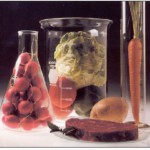 From Food & Water Watch: A year ago French microbiologist Gilles-Eric Séralini dared to take a critical look at the safety of genetically engineered crops. He found serious problems in the health of rats fed Monsanto’s NK603 corn, and his findings were published in a prestigious academic journal, following the normal peer-review process.
From Food & Water Watch: A year ago French microbiologist Gilles-Eric Séralini dared to take a critical look at the safety of genetically engineered crops. He found serious problems in the health of rats fed Monsanto’s NK603 corn, and his findings were published in a prestigious academic journal, following the normal peer-review process.


